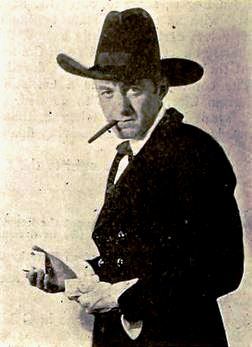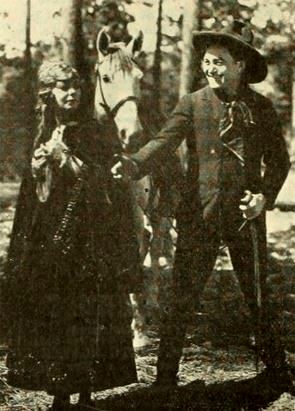
Lane Chandler was an American actor specializing mainly in Westerns.

An Unseen Enemy is a 1912 Biograph Company short silent film directed by D. W. Griffith, and was the first film to be made starring the actresses Lillian Gish and Dorothy Gish. A critic of the time stated that "the Gish sisters gave charming performances in this one-reel film". The film was shot in Fort Lee, New Jersey where early film studios in America's first motion picture industry were based at the beginning of the 20th century. Consistent with practice at that time, the actors in the cast and their roles are not listed in the film..
William Anton Gittinger, best known as William Steele, was an American actor of small roles in Westerns, particularly those of John Ford.

This is a list of films featuring Harry Carey.
A Feud in the Kentucky Hills is a 1912 American silent drama film directed by D. W. Griffith. The film, by the Biograph Company, was shot on the Hudson Palisades near Fort Lee, New Jersey when many early film studios in America's first motion picture industry were based there at the beginning of the 20th century. Additional filming took place in and around the Pike County town of Milford, Pennsylvania.
The Bad Man of Cheyenne is a 1917 two-reel American silent Western short featuring Harry Carey and Priscilla Dean. The film's survival status is unknown.

A 44-Calibre Mystery is a 1917 American short Western film, featuring Harry Carey. Carey plays the role of Sheriff Cheyenne Harry. He saves Kitty Flanders from Pete McGuire and takes her safely home. McGuire hides in a shack on Mr. Flanders' stake and Harry's deputy is shot dead, apparently by Mr. Flanders. McGuire offers to keep quiet about the murder if Flanders gives him half a stake and his daughter's hand in marriage. Mr. Flanders confesses his crime to Sheriff Harry and learns that he is innocent. Sheriff Harry notices McGuire's gun and accuses him of the crime, but they are killed as they try to escape. The film concludes as Kitty Flanders confesses her love to Sheriff Cheyenne as she bandages his wounds from the fight.

The Phantom Riders is a 1918 silent American Western film directed by John Ford and featuring Harry Carey. The film is considered to be lost.

Three Mounted Men is a 1918 American silent Western film directed by John Ford and featuring Harry Carey. The film is considered to be lost.
A Fight for Love was a 1919 American Western film directed by John Ford and featuring Harry Carey. The film is considered to be lost.

Bare Fists is a 1919 American Western film directed by John Ford and featuring Harry Carey. It is considered to be a lost film.

Riders of Vengeance is a 1919 American Western film directed by John Ford and featuring Harry Carey. The film is considered to be lost.

The Outcasts of Poker Flat is a 1919 American silent Western film directed by John Ford and featuring Harry Carey. The film is considered to be lost. The screenplay is based upon the 1869 story of the same name by Bret Harte. Harte's story has been brought to film at least five times, including in 1937 with Preston Foster and in 1952 with Dale Robertson.

A Gun Fightin' Gentleman is a 1919 American Western film directed by John Ford and starring Harry Carey. Because only three reels of originally five or six are known to exist, this film is considered a partially lost film.

Marked Men is a 1919 American silent Western film directed by John Ford and starring Harry Carey. Considered to be lost, it is a remake of the 1916 film The Three Godfathers, which also starred Carey.

Sundown Slim is a 1920 American silent Western film starring Harry Carey.

Rustlers or The Rustlers is a 1919 American short silent Western film produced by John Ford and directed by Reginald Barker under the working title of Even Money. The film was shot between February 28 and March 8, 1919 for April release that same year. Ford himself chose to bring Pete Morrison into this project, and during the time of the film's shooting, he and Baker co-chaired a committee created by William Beaudine, then-president of The Motion Pictures Director's Association.
Frank Birney Ellis was an American actor in silent and sound films and serials. He appeared in more than 480 films between 1917 and 1954. He was born in Oklahoma and died in Los Angeles, California. He appeared as a townsman in uncredited roles in the TV Western series Gunsmoke -- S7E27's ”Wagon Girls” (1962); and S9E8's “Carter Caper” (1963).

Joe Harris was an American actor, who between 1913 and 1923 appeared in at least 94 silent films, many of them cowboy westerns. He often played villains opposite early cowboy star Harry Carey.
Harry L. Decker (1887–1959) was an American film producer associated with Columbia Pictures where he mainly oversaw production on western films. He also produced the 1937 ice hockey-themed mystery The Game That Kills starring Rita Hayworth. He began his career in the silent era as a film editor, working at a variety of studios.














